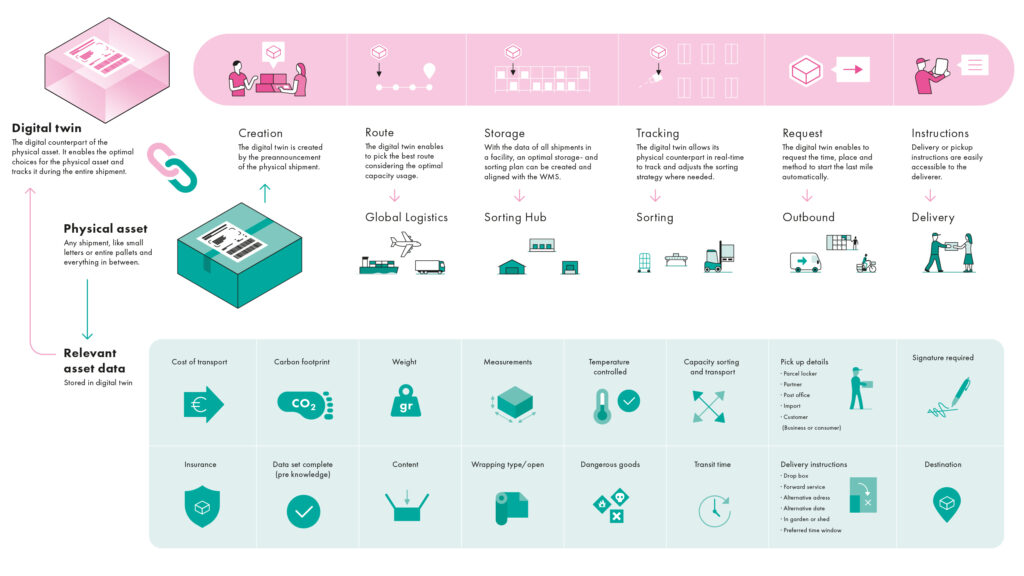Digital twins help postal and logistics companies plan for the future
10th May 2024

Outside of fantasy novels, nobody has a crystal ball to see into the future. However, postal services and logistics companies are building digital twins to achieve just that. Powered by data-driven virtual models that can simulate real-world operations, digital twins are allowing the sector to predict the future and plan for it.
Alexandra Ballestrem, Key Account Director, and Roosmarijn Schopman, Proposition Manager at Prime Vision, explore how digital twins are providing unparallelled foresight in logistics operations.
Reducing uncertainty
Postal and logistics processes are beholden to a multitude of factors, many of which are outside the control of a business. With customer expectations regarding speed of delivery at an all-time high, maintaining service levels during operational shocks is a constant challenge, as nobody knows what’s coming next. Consequently, companies are looking for tools to mitigate uncertainty and assist in contingency planning.
Mature logistics operations are highly automated. Whenever a parcel or letter travels through a sorting centre, it is photographed, scanned and tracked by a wide array of equipment. This generates masses of data, which can be stored and analysed to offer insights into an operation. Increasingly, postal and logistics companies are using these data streams to build digital twins.
A digital twin is a virtual representation of a physical object, or in this case, a process. By feeding real-world data into bespoke mathematic models that accurately reflect operations, owners of a digital twin can simulate how changing parameters can affect their business. With the masses of data required to drive the system already available from existing automation equipment, a digital twin allows almost limitless experimentation with minimal risk. While no crystal ball, it enables businesses to conduct effective contingency planning, and possibly more.
Digital Postage Twins
Take, for example, an increase in parcel or letter volumes. The key question is, are existing processes flexible enough to effectively manage this higher volume between current facilities? If not, is investment in a new sorting centre, equipment or staff required? Using a digital twin, businesses can feed increased parcel and letter volumes into the models, testing operations to get an answer. A new sorting centre will require at least five years to offer return on investment (ROI), so having a data driven system to properly inform the decision is invaluable.
Unforeseen breakdowns are another event that can be modelled and mitigated by a digital twin. With postal services operating 20 to 80 hubs in a country depending on size, what would happen if one were to go down? This can be replicated in the digital twin and the effects observed. More than that, it allows businesses to proactively plan and strategize to keep downtime and delivery delays to a minimum. Using the simulation, operators can find the best way to spread volumes and reduce the impact, rather than carrying out a time-consuming postmortem after the event.
The virtual world exerting physical control
While these scenarios focus on sortation, digital twins have plenty more possibilities. Simulations can be carried out to test how to use available floorspace within a warehouse and discover new efficiencies. Companies using robots can replicate their entire fleet digitally and find ways to optimise movement within a facility. If the data is available, delivery vehicles can be included to predict how goods could travel between different sorting centres for processing.
With coverage over an entire operation, a digital twin can actively influence the physical world and open the door to dynamic sorting and self-organising logistics. By creating a virtual counterpart of letters, parcels and pallets, the digital twin can make automatic decisions to adjust pick-ups, inbound goods, sorting and outbound deliveries to improve the speed, quality and flexibility of logistics processes. As a result, users can improve service while lowering operating and capital expenditure.
A proven partner for digital twins
Accessing the benefits of a digital twin is no easy task. First of all, a business must record as many physical events as possible via equipment in its facility. This helps to build a complete data set and deliver accurate predictions. With data collected and stored, a knowledgeable expert must turn customer process parameters and factors into working mathematical models and software. An analytical dashboard is also required to present results.

Prime Vision is an expert in building digital twins from the ground up. Its computer vision systems, analytical software, data storage solutions and robotics are embedded in the sortation process from start to finish, providing customers in its install-base with the data required to build an accurate simulation. Its digital twins are even compatible with products from other vendors, ensuring widespread coverage. The company specialises in seamlessly integrating its automation products with existing customer infrastructure.
In all cases, Prime Vision can flexibly unite sporadic sources of data to build a functional and impactful digital twin. Its research and development engineers are adept at translating physical operations into working software models and providing an accurate digital representation of unique customer processes. This can be hosted within a customer environment or by Prime Vision, either at a premises or on the cloud.
For postal or logistics companies looking to take a proactive approach to contingency planning, a digital twin is essential to make the right predictions and decisions. By partnering with an expert like Prime Vision, these businesses have no need of a fortune teller to secure efficiency and future resilience.
More from Prime Vision: https://primevision.com/the-letterverse-digital-twins-help-postal-and-logistics-companies-plan-for-the-future/

